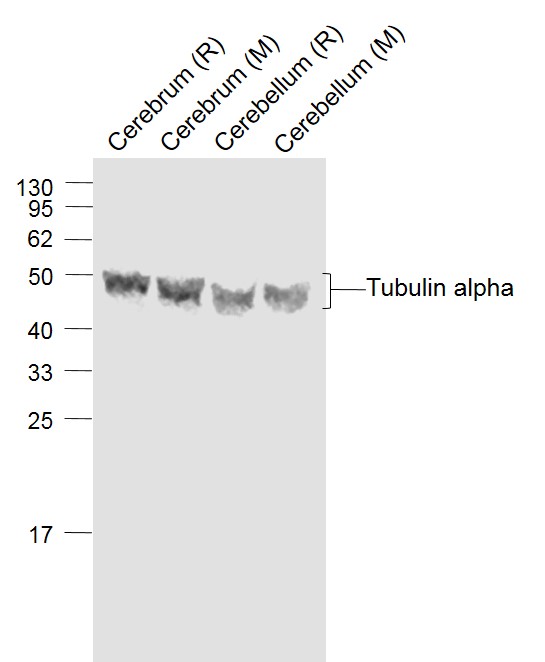![ICC/IF analysis of HeLa cells using GTX16292 Tubulin (Acetyl Lys40) antibody [6-11B-1] at 1:2000 (red) with DAPI(blue). Cells were fixed and permeabilized with 4% paraformaldehyde followed by 0.5% Triton? X-100. ICC/IF analysis of HeLa cells using GTX16292 Tubulin (Acetyl Lys40) antibody [6-11B-1] at 1:2000 (red) with DAPI(blue). Cells were fixed and permeabilized with 4% paraformaldehyde followed by 0.5% Triton? X-100.](https://www.genetex.com/upload/website/prouct_img/normal/GTX16292/GTX16292_20170605_ICCIF_w_23060620_115.webp)
ICC/IF analysis of HeLa cells using GTX16292 Tubulin (Acetyl Lys40) antibody [6-11B-1] at 1:2000 (red) with DAPI(blue). Cells were fixed and permeabilized with 4% paraformaldehyde followed by 0.5% Triton? X-100.
Tubulin (Acetyl Lys40) antibody [6-11B-1]
GTX16292
ApplicationsDot Blot, Electron Microscopy, ImmunoFluorescence, Western Blot, ELISA, ImmunoCytoChemistry, ImmunoHistoChemistry, RadioImmunoAssay
Product group Antibodies
ReactivityAmphibian, Bovine, Canine, Chicken, Hamster, Human, Monkey, Mouse, Porcine, Rat, Sea Urchin, Zebra Fish
TargetTUBA4A
Overview
- SupplierGeneTex
- Product NameTubulin (Acetyl Lys40) antibody [6-11B-1]
- Delivery Days Customer9
- Application Supplier NoteWB: 1:2,000. *Optimal dilutions/concentrations should be determined by the researcher.Not tested in other applications.
- ApplicationsDot Blot, Electron Microscopy, ImmunoFluorescence, Western Blot, ELISA, ImmunoCytoChemistry, ImmunoHistoChemistry, RadioImmunoAssay
- CertificationResearch Use Only
- ClonalityMonoclonal
- Clone ID6-11B-1
- ConjugateUnconjugated
- Gene ID7277
- Target nameTUBA4A
- Target descriptiontubulin alpha 4a
- Target synonymsALS22, CMYO26, FTDALS9, H2-ALPHA, OZEMA23, SPAX11, TUBA1, tubulin alpha-4A chain, tubulin H2-alpha, tubulin alpha-1 chain, tubulin, alpha 1 (testis specific)
- HostMouse
- IsotypeIgG2b
- Protein IDP68366
- Protein NameTubulin alpha-4A chain
- Scientific DescriptionMicrotubules of the eukaryotic cytoskeleton perform essential and diverse functions and are composed of a heterodimer of alpha and beta tubulin. The genes encoding these microtubule constituents are part of the tubulin superfamily, which is composed of six distinct families. Genes from the alpha, beta and gamma tubulin families are found in all eukaryotes. The alpha and beta tubulins represent the major components of microtubules, while gamma tubulin plays a critical role in the nucleation of microtubule assembly. There are multiple alpha and beta tubulin genes and they are highly conserved among and between species. This gene encodes an alpha tubulin that is a highly conserved homolog of a rat testis-specific alpha tubulin. [provided by RefSeq, Jul 2008]
- ReactivityAmphibian, Bovine, Canine, Chicken, Hamster, Human, Monkey, Mouse, Porcine, Rat, Sea Urchin, Zebra Fish
- Storage Instruction-20°C or -80°C,2°C to 8°C
- UNSPSC41116161
References
- A novel HDAC11 inhibitor potentiates the tumoricidal effects of cordycepin against malignant peripheral nerve sheath tumor through the Hippo signaling pathway. Huang PY et al., 2022, Am J Cancer ResRead this paper
- Type-3 Hyaluronan Synthase Attenuates Tumor Cells Invasion in Human Mammary Parenchymal Tissues. Lee WJ et al., 2021 Oct 29, MoleculesRead this paper
- Structure, development, and functional morphology of the cement gland of the giant danio, Devario malabaricus. Nelson HM et al., 2019 Jul 16, Dev DynRead this paper
- Pla2g6 Deficiency in Zebrafish Leads to Dopaminergic Cell Death, Axonal Degeneration, Increased beta-Synuclein Expression, and Defects in Brain Functions and Pathways. Sanchez E et al., 2018 Aug, Mol NeurobiolRead this paper
- Megakaryocyte lineage-specific class VI beta-tubulin suppresses microtubule dynamics, fragments microtubules, and blocks cell division. Yang H et al., 2011 Mar, Cytoskeleton (Hoboken)Read this paper

![WB analysis of (1)HeLa (2) U87 (3) COS7 (4) P19 (5) rat2 (6) CHO (7) MDBK (8) MDCK cells using GTX16292 Tubulin (Acetyl Lys40) antibody [6-11B-1] at 1:2,000. WB analysis of (1)HeLa (2) U87 (3) COS7 (4) P19 (5) rat2 (6) CHO (7) MDBK (8) MDCK cells using GTX16292 Tubulin (Acetyl Lys40) antibody [6-11B-1] at 1:2,000.](https://www.genetex.com/upload/website/prouct_img/normal/GTX16292/GTX16292_20170605_WB_w_23060620_654.webp)



![alpha Tubulin antibody [HL2162] detects alpha Tubulin protein at cytoskeleton by immunofluorescent analysis. Sample: HeLa cells were fixed in 4% paraformaldehyde at RT for 15 min. Green: alpha Tubulin stained by alpha Tubulin antibody [HL2162] (GTX638140) diluted at 1:500. Blue: Fluoroshield with DAPI (GTX30920).](https://www.genetex.com/upload/website/prouct_img/normal/GTX638140/GTX638140_T-44928_20230303_ICC_IF_23032022_953.webp)
![WB analysis of (1) HeLa, (2) Jurkat, (3) COS7, (4) NIH-3T3, (5) PC-12, (6) RAT2, (7) CHO, (8) MDBK and (9) MDCK lysates using alpha Tubulin antibody [B-5-1-2] at 0.5 μg/ml.](https://www.genetex.com/upload/website/prouct_img/normal/GTX11304/GTX11304_20170605_WB_w_23060500_512.webp)

